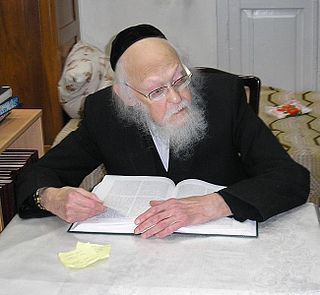Related Research Articles
Amoraim refers to Jewish scholars of the period from about 200 to 500 CE, who "said" or "told over" the teachings of the Oral Torah. They were primarily located in Babylonia and the Land of Israel. Their legal discussions and debates were eventually codified in the Gemara. The Amoraim followed the Tannaim in the sequence of ancient Jewish scholars. The Tannaim were direct transmitters of uncodified oral tradition; the Amoraim expounded upon and clarified the oral law after its initial codification.

Abraham Isaac Kook, known as Rav Kook, and also known by the acronym HaRaAYaH, was an Orthodox rabbi, and the first Ashkenazi Chief Rabbi of British Mandatory Palestine. He is considered to be one of the fathers of religious Zionism and is known for founding the Mercaz HaRav Yeshiva.

A Rebbe or Admor is the spiritual leader in the Hasidic movement, and the personalities of its dynasties. The titles of Rebbe and Admor, which used to be a general honor title even before the beginning of the movement, became, over time, almost exclusively identified with its Tzadikim.

The Shulchan Aruch HaRav is especially a record of prevailing halakha by Rabbi Shneur Zalman of Liadi (1745–1812), known during his lifetime as HaRav and as the first Rebbe of Chabad. Within the Chabad community the work is known as the Alter Rebbe's Shulchan Aruch.
According to the Bible, Shelah/Shela was the youngest son of Judah, and was born at Chezib, which can be identified with an unknown town in the vicinity of Mareshah.
Shela may refer to:

Yosef Shalom Elyashiv was a Haredi rabbi and posek who lived in Jerusalem. Until his death at the age of 102, Rav Elyashiv was the paramount leader of both Israel and the Diaspora Lithuanian-Haredi community, and many Ashkenazi Jews regarded him as the posek ha-dor, the contemporary leading authority on halakha, or Jewish law.

Isaiah or Yeshayahu ben Avraham Ha-Levi Horowitz, , also known as the Shelah HaKaddosh after the title of his best-known work, was a prominent rabbi and mystic.

Tashlikh or Tashlich is a customary Jewish atonement ritual performed during the High Holy Days on Rosh Hashanah. In some Judaeo-Spanish-speaking communities the practice is referred to as sakudirse las faldas or simply as faldas.
Yaakov Yitzchok Ruderman was a prominent Talmudic scholar and rabbi who founded and served as rosh yeshiva of Yeshivas Ner Yisroel in Baltimore.
Meshulam Fayish Tzvi (Herman) Gross or Grosz (1863–1947) was a businessman, inventor and learned layman, author of two sefarim of Torah novellae, Nachlas Tzvi and Ateres Tzvi.
Halevi may refer to:
Rav is the Hebrew generic term for a person who teaches Torah or is a Jewish spiritual guide or a rabbi. For example, Pirkei Avot states (1:6) that:
(..) Joshua ben Perachiah says, "Set up a teacher [RaB] for yourself. And get yourself a friend [HaBeR]. And give everybody the benefit of the doubt."
Shela was a Babylonian teacher of the latter part of the tannaitic and the beginning of the amoraic period, and head of the school ("sidra") at Nehardea. When Rav visited Babylonia, he once officiated as an expounder (amora) for R. Shela at his public lectures. The school at Nehardea was named in honor of Shela; and its scholars were accordingly known as "D'Bei R. Shela."
There are a number of honorifics in Judaism that vary depending on the status of, and the relationship to, the person to whom one is referring.
Liska is the name of a Hasidic dynasty founded by Rabbi Tzvi Hirsch Friedman (Frishman). It takes its name from the Yiddish name for Olaszliszka, a village in Borsod-Abaúj-Zemplén county, Hungary.
Shelah may refer to:

Kiryat Unsdorf, also known as Sorotzkin, after its main street, is a Haredi Jewish neighborhood in Jerusalem. It is located along the northern edge of the mountain plateau on which central Jerusalem lies. Constructed between 1970 and 1985, Unsdorf is home to several landmark educational centers. A large percentage of residents are American-born.
Rabbah b. Shela was a Babylonian rabbi of the 4th century.
In Rabbinic literature, ḥiddush refers to a novel interpretation or approach to previously-existing ideas or works. The term often describes a form of innovation that is made inside the system of Halakha, as distinguished from shinuy, an innovation outside tradition.
References
- ↑ According to Sons of Noah#Arpachshad's family (genealogy of Abraham)
- ↑ In English transliteration of Hebrew, "Rav" means "Rabbi".